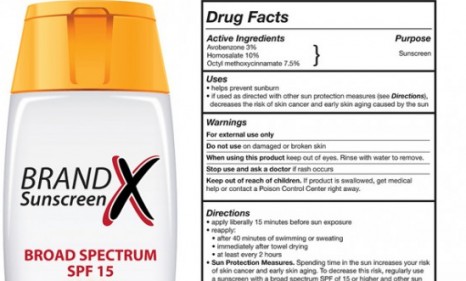The FDA's 'rigorous' new sunscreen rules
The feds release tough new guidelines aimed at preventing sunscreen manufacturers from making dubious claims

A free daily email with the biggest news stories of the day – and the best features from TheWeek.com
You are now subscribed
Your newsletter sign-up was successful
For the first time in 33 years, the FDA issued "rigorous" new rules on Tuesday designed to "sort out the confusing world of sunscreens." Among the changes to the $680 million industry: Sunscreens must equally protect against UVB and UVA rays, and can no longer claim to be "sweatproof" or "waterproof," as both feats are impossible. So what does this mean for your summer in the sun? Here, a brief guide:
What do those SPF labels mean?
Most consumers pick their sunscreen based on its advertised sun protection factor (SPF), a number that indicates how long the lotion will protect a user from the sun. (Supposedly, if you multiply the SPF by the number of minutes you can normally be outdoors without burning, you get an estimate of how long a given sunscreen will protect you.) But SPF only refers to protection against UVB rays, which cause burning and skin cancer. UVA rays, which aren't included in SPF ratings, "can wreak their own damage," says Katherine Hobson at The Wall Street Journal, including premature aging and skin cancer.
The Week
Escape your echo chamber. Get the facts behind the news, plus analysis from multiple perspectives.

Sign up for The Week's Free Newsletters
From our morning news briefing to a weekly Good News Newsletter, get the best of The Week delivered directly to your inbox.
From our morning news briefing to a weekly Good News Newsletter, get the best of The Week delivered directly to your inbox.
So what are these new rules?
Now, sunscreens must indicate whether they protect against UVA rays, too. Those that do will earn the "coveted designation" of having "broad spectrum protection," says Gardiner Harris at The New York Times. Sunbathers looking for the best protection from all harmful rays should look for sunscreens labeled with SPF 15 or higher, and the "broad spectrum protection" label.
Are SPF labels still accurate?
SPF numbers are still a reliable measure of how long a sunscreen protects against UVB rays. But the FDA wants to cap the maximum SPF value a sunscreen can advertise at SPF 50+. Though many manufacturers are clamoring to introduce products with SPF numbers of 80 or 100, they "offer little more protection" than SPF 50 sunscreen, Harris says.
A free daily email with the biggest news stories of the day – and the best features from TheWeek.com
And sunscreen is no longer waterproof?
It never was. The FDA's new rules, which go into effect in a year, are trying to counteract false advertising, says Hobson. Claims that sunscreens are "waterproof" or "sweatproof" are false — there's scientifically no way to make that 100 percent true. Similarly, calling a sunscreen "sunblock" will no longer be allowed. "These claims overstate their effectiveness," says the FDA. Instead, sunscreens will be permitted to say they are "water-resistant," but labels must indicate the exact length of time that promise holds up.
Why did these changes take so long?
When the new FDA rules were first under consideration, it was 1978, "Boogie Oogie Oogie" was a radio hit, and "beach lotions were intended to encourage tanning, not protect against it," says Harris. Decades of tweaking led to a proposal in 2007 to require sunscreen labels to rate their product on a star-based system for indicating UVA protection, in addition to providing a SPF number for UVB protection. While that system was ultimately ditched, it's not surprising that major guideline changes are happening now, says Alan Rappeport at the Financial Times. The Obama administration is "aggressively trying to combat skin cancer," a disease that afflicted more than 1 million people in the U.S. last year.
Sources: FDA, Wall Street Journal, New York Times, Financial Times